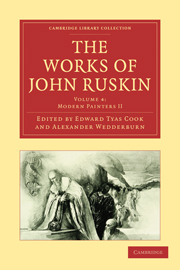Book contents
- Frontmatter
- Contents
- LIST OF ILLUSTRATIONS
- INTRODUCTION TO THIS VOLUME
- BIBLIOGRAPHICAL NOTE
- MODERN PAINTERS
- AUTHOR'S PREFACE TO THE RE-ARRANGED EDITION (1883)
- AUTHOR'S SYNOPSIS OF CONTENTS
- PART III OF IDEAS OF BEAUTY
- SECTION I OF THE THEORETIC FACULTY
- SECTION II OF THE IMAGINATIVE FACULTY
- INTRODUCTORY NOTE (1883)
- CHAPTER I OF THE THREE FORMS OF IMAGINATION
- CHAPTER II OF IMAGINATION ASSOCIATIVE
- CHAPTER III OF IMAGINATION PENETRATIVE
- CHAPTER IV OF IMAGINATION CONTEMPLATIVE
- CHAPTER V OF THE SUPERHUMAN IDEAL
- ADDENDA (1848)
- AUTHOR'S EPILOGUE TO THE RE-ARRANGED EDITION (1883)
- APPENDIX
- Plate section
CHAPTER V - OF THE SUPERHUMAN IDEAL
Published online by Cambridge University Press: 05 September 2013
- Frontmatter
- Contents
- LIST OF ILLUSTRATIONS
- INTRODUCTION TO THIS VOLUME
- BIBLIOGRAPHICAL NOTE
- MODERN PAINTERS
- AUTHOR'S PREFACE TO THE RE-ARRANGED EDITION (1883)
- AUTHOR'S SYNOPSIS OF CONTENTS
- PART III OF IDEAS OF BEAUTY
- SECTION I OF THE THEORETIC FACULTY
- SECTION II OF THE IMAGINATIVE FACULTY
- INTRODUCTORY NOTE (1883)
- CHAPTER I OF THE THREE FORMS OF IMAGINATION
- CHAPTER II OF IMAGINATION ASSOCIATIVE
- CHAPTER III OF IMAGINATION PENETRATIVE
- CHAPTER IV OF IMAGINATION CONTEMPLATIVE
- CHAPTER V OF THE SUPERHUMAN IDEAL
- ADDENDA (1848)
- AUTHOR'S EPILOGUE TO THE RE-ARRANGED EDITION (1883)
- APPENDIX
- Plate section
Summary
The subject is not to be here treated in detail
In our investigation, in the first Section, of the laws of beauty, we confined ourselves to the observation of lower nature, or of humanity. We were prevented from proceeding to deduce conclusions respecting Divine ideality by our not having then established any principles respecting the Imaginative faculty, by which, under the discipline of the Theoretic, such ideality is conceived. I had purposed to conclude the present Section by a careful examination of this subject; but as this is evidently foreign to the matter immediately under discussion, and involves questions of great intricacy respecting the development of mind among those Pagan nations who are supposed to have produced high examples of spiritual ideality, I believe it will be better to delay such inquiries until we have concluded our detailed observation of the beauty of visible nature; and I shall therefore at present take notice only of one or two principles, which were referred to, or implied, in the chapter respecting the Human ideal, and without the enunciation of which that chapter might lead to false conclusions.
The conceivable modes of manifestion of Spiritual Beings are four
There are four ways in which Beings supernatural may be conceived as manifesting themselves to human sense. The first, by external types, signs, or influences; as God to Moses in the flames of the bush, and to Elijah in the voice of Horeb.
- Type
- Chapter
- Information
- The Works of John Ruskin , pp. 314 - 332Publisher: Cambridge University PressPrint publication year: 2010First published in: 1903



